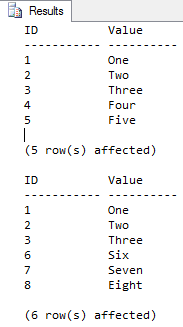CREATE TABLE #table1
(
ID INT,
Value VARCHAR(10)
)
INSERT INTO #table1 (ID, Value) VALUES(1,'One')
INSERT INTO #table1 (ID, Value) VALUES(2,'Two')
INSERT INTO #table1 (ID, Value) VALUES(3,'Three')
INSERT INTO #table1 (ID, Value) VALUES(4,'Four')
INSERT INTO #table1 (ID, Value) VALUES(5,'Five')
CREATE TABLE #table2
(
ID INT,
Value VARCHAR(10)
)
INSERT INTO #table2 (ID, Value) VALUES(1,'One')
INSERT INTO #table2 (ID, Value) VALUES(2,'Two')
INSERT INTO #table2 (ID, Value) VALUES(3,'Three')
INSERT INTO #table2 (ID, Value) VALUES(6,'Six')
INSERT INTO #table2 (ID, Value) VALUES(7,'Seven')
INSERT INTO #table2 (ID, Value) VALUES(8,'Eight')
SELECT *
FROM #table1
SELECT *
FROM #table2
/* INNER JOIN OR JOIN*/
- INNER JOIN Or JOIN returns the
matching records from both the tables (#table1 and
#table2).
- INNER keyword is optional instead of using the full qualified keyword you can also use JOIN keyword.
SELECT tbl1.*,tbl2.*
FROM #table1 tbl1
INNER JOIN #table2 tbl2 ON tbl1.ID = tbl2.ID
SELECT tbl1.*,tbl2.*
FROM #table1 tbl1
JOIN #table2 tbl2 ON tbl1.ID = tbl2.ID
/* LEFT JOIN */
- LEFT JOIN returns all the
records from the LEFT table (#table1) and matching record from the
RIGHT table (#table2).
- Unmatched records from the
RIGHT table (#table2) returns NULL.
SELECT tbl1.*,tbl2.*
FROM #table1 tbl1
LEFT JOIN #table2 tbl2 ON tbl1.ID = tbl2.ID
/*
RIGHT JOIN */
- RIGHT
JOIN returns the all records from the RIGHT table (#table2) and matching
records from the LEFT table (#table1).
- Unmatched record from the
LEFT table (#table1) returns NULL.
SELECT tbl1.*,tbl2.*
FROM #table1 tbl1
RIGHT JOIN #table2 tbl2 ON tbl1.ID = tbl2.ID
/*LEFT
OUTER JOIN */
- In
LEFT OUTER JOIN Outer keyword is optional.
- LEFT
OUTER JOIN works like a LEFT JOIN.
SELECT tbl1.*,tbl2.*
FROM #table1 tbl1
LEFT OUTER JOIN #table2 tbl2 ON tbl1.ID = tbl2.ID
/*RIGHT
OUTER JOIN */
- In
RIGHT OUTER JOIN Outer keyword is optional.
- RIGHT
OUTER JOIN works like a RIGHT JOIN.
SELECT tbl1.*,tbl2.*
FROM #table1 tbl1
RIGHT OUTER JOIN #table2 tbl2 ON tbl1.ID = tbl2.ID
/*FULL OUTER JOIN */
- FULL
OUTER JOIN returns all the records from the both tables (#table1
and #table2).
- Unmatched
record from both table returns NULL
SELECT tbl1.*,tbl2.*
FROM #table1 tbl1
FULL OUTER JOIN #table2 tbl2 ON tbl1.ID = tbl2.ID
/*SELF
JOIN */
- SELF
JOIN is used to join a table to itself with difference alias.
SELECT tbl1.*,tbl2.*
FROM #table1 tbl1
JOIN #table1 tbl2 ON tbl1.ID = tbl2.ID
/*
CROSS JOIN */
- CROSS
JOIN returns the Cartesian product of the sets of records from the two or
more joined tables.
- In
General word each row from Left table multiplied by Number of Rows in
Right table.
SELECT tbl1.*,tbl2.*
FROM #table1 tbl1
CROSS JOIN #table2 tbl2
/*
LEFT JOIN - WHERE NULL */
- Returns
the NULL records from the RIGHT table.
SELECT tbl1.*,tbl2.*
FROM #table1 tbl1
LEFT JOIN #table2 tbl2 ON tbl1.ID = tbl2.ID
WHERE tbl2.ID IS NULL
/*
RIGHT JOIN - WHERE NULL */
- Returns
the NULL records from the LEFT table.
SELECT tbl1.*,tbl2.*
FROM #table1 tbl1
RIGHT JOIN #table2 tbl2 ON tbl1.ID = tbl2.ID
WHERE tbl1.ID IS NULL
/*
OUTER JOIN - WHERE NULL */
- Returns
the NULL records from the both tables (#table1 and #table2).
SELECT tbl1.*,tbl2.*
FROM #table1 tbl1
FULL OUTER JOIN #table2 tbl2 ON tbl1.ID = tbl2.ID
WHERE tbl1.ID IS NULL OR tbl2.ID IS NULL
DROP TABLE #table1
DROP TABLE #table2












No comments:
Post a Comment